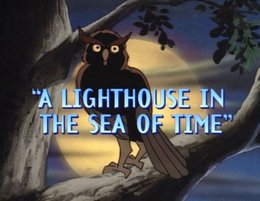Difference between revisions of "A Lighthouse in the Sea of Time"
Supermorff (talk | contribs) m (cat order) |
(→Links: ditto) |
||
| Line 24: | Line 24: | ||
*[http://www.s8.org/gargoyles/askgreg/search.php?rid=271 Background Memo] | *[http://www.s8.org/gargoyles/askgreg/search.php?rid=271 Background Memo] | ||
*[http://www.s8.org/gargoyles/askgreg/search.php?rid=103 Greg's Ramble] | *[http://www.s8.org/gargoyles/askgreg/search.php?rid=103 Greg's Ramble] | ||
| − | + | *[http://www.gargoyles-fans.org/reviews/ep17.htm Extensive Synopsis and Review] | |
{| align="center" border="1" | {| align="center" border="1" | ||
Revision as of 17:37, 12 August 2007
"A Lighthouse in the Sea of Time" is the seventeenth televised episode of the series Gargoyles, and the fourth episode of Season 2.
- Story: Brynne Chandler Reaves & Lydia C. Marano
- Story Editor: Michael Reaves
Summary
Tidbits
Macbeth's two henchmen, introduced in this story (they would reappear in Sanctuary, Pendragon, Nightwatch and The Journey), are never named in the dialogue, but the ending credits list them as Banquo and Fleance. Both names are taken from Shakespeare's Macbeth, of course; in the play, Banquo is a leading Scottish nobleman and Fleance his son. After Macbeth learns from the three Witches that Banquo's descendants will someday rule Scotland, though Banquo himself never will, he moves against his former friend, having him murdered; Fleance escapes, however, and his descendants indeed come to rule Scotland in the form of the Stuart dynasty (among whose members was James VI of Scotland and I of England, under whose reign Shakespeare wrote Macbeth).
Macbeth provides another Shakespearean link directly in the dialogue when he goes by the alias of Lennox Macduff. As Jeffrey Robbins explains to Hudson, Lennox and Macduff are two characters from Shakespeare's Macbeth: Lennox plays only a small part as one of several Scottish thanes, but Macduff occupies a more prominent position as the man who will slay Macbeth at the end. (Lennox and Macduff both enter together in Act II, scene iii, directly after the Porter scene - and providing the knocking at the door that the Porter was answering.)
When Goliath mentions that the public library adjacent to the clock tower contains several books on Merlin, it was originally planned that he would list a few of these, such as Mary Stewart's The Crystal Cave. However, the production team was unable to secure legal permission to name these books, and so dropped the list.
Gilly, Jeffrey's seeing-eye dog, was named after Gilgamesh, a legendary king in ancient Sumer (oddly enough, Gillie is referred to in the dialogue as female). Greg Weisman has indicated that Gilgamesh was the subject of one of Jeffrey Robbins' past novels, and that Gillie's name was a reference to or hint of this.
One line connected to the Scrolls of Merlin has generated a small amount of "fan-confusion". The inscription on the bound Scrolls that Macbeth reads aloud begins, "The Scrolls of Merlin, sealed by my own hand". The "by my own hand" portion alludes to Merlin, but some viewers, led astray by the fact that Macbeth is reading these words, mistakenly assumed that Macbeth had been the one to seal them.
The archaeologists Lydia Duane and Arthur Morwood-Smyth who discover the Scrolls at the beginning were named after no less than four "Gargoyles" writers: Lydia Marano, Diane Duane, Arthur Byron Cover, and Peter Morwood. They would reappear (in a far less Arthurian context) in Sentinel.
Links
| << Previous Episode: "Legion" | Next Episode: "The Mirror" >> |
